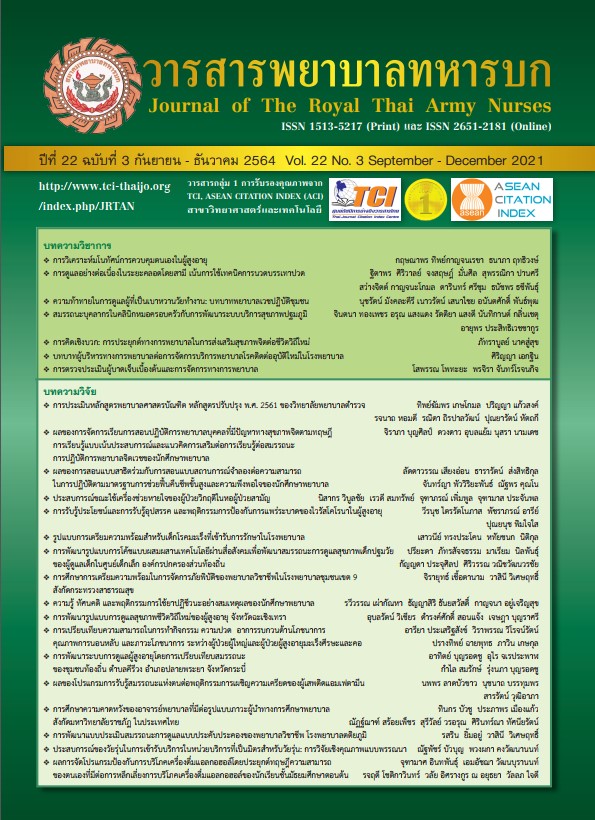The Effects of An Alcohol Beverages Self-Control Program on The Drinking Behaviors of Alcohol Use Disorder Patients in Nakhon Ratchasima Health Promoting Hospitals, Thailand
Keywords:
alcohol self-control program, alcohol drinking behaviors, alcohol use disorder patientsAbstract
The purpose of this quasi-experimental study was to examine the effects of an alcohol beverage self-control program on the drinking behaviors of alcohol use disorder patients in Nakhon Ratchasima Health Promoting Hospitals in Thailand. The sample was composed of 72 male alcohol use disorder patients aged between 20 and 60 years. Subjects were divided into two groups with thirty-six subjects in each group and they were randomly assigned to either the experimental or control group. The experimental group participated in the alcohol self-control program. It consisted of 8 activities, each taking about 90 minutes per week for 8 consecutive weeks, continuously, while the participants in the control group received the standard program of care for alcohol use disorders in the Health Promoting Hospitals. The alcohol drinking behavior scores were measured using the Alcohol Consumption Assessment (ACA: Thai version) before, between, and after participating in the alcohol self-control program. Descriptive statistics were used to represent the personal information about the participants. The effects of the program were determined using repeated measures ANOVA and t-test.
The results showed that the mean scores for alcohol drinking behavior in the experimental group were statistically significantly lower across the three times of evaluation after program completion (F = 37.51, p <.001). Additionally, the mean scores for the experimental group were significantly lower than those of the control group (F = 23.281, p <.001). It is recommended that this alcohol self-control program can reduce or stop alcohol drinking behaviors and can decrease the impacts of excessive alcohol drinking behaviors.
Downloads
References
World Health Organization. Global status report on alcohol and health. Geneva: Department of Mental Health and Substance use disorders, Geneva. WHO Press. 2014.
Sawitri A. National Library of Thailand Cataloging in Publication Data 2019. Bangkok: Seamstress. 2019.
National Statistical Office. The Smoking and Drinking Behavior Survey; 2018.
Demirkol, A., Haber, P. & Conigrave, K. Problem drinking-detection and assessment in general practice. 2011.
Phuipha T. Bunthumporn N. Vuthiarpa S. The effect of a life-skill training program on the depressive symptoms of senior high school students. J Royal Thai Army Nurses. 2018; 19(3): 89-97. (in Thai).
Manote L, Promote S. Psychiatric and Mental Health. Bangkok: Beyond Enterprise Company Limited. 2009.
Touchanun K. The Estimation of Societal Cost of Alcohol Consumption in Thailand: The Development of Estimation Template. Bangkok. Center of Alcohol Studies. 2015.
Narkdilok, S. The study of incident rat with relapse use of methamphetamine at Princess Mother National Institute on Drug Abuse Treatment. Thai journal of Addiction. 2020; 6(1): 47-58.
Princess Mother National Institute on Drug Abuse Treatment. Alcohol Patients in 2010-2011. 2011.
Porntip K, Siriporn C, Sawat T. The Development Empowerment Program on Management with Drinking Behavior of Alcohol Dependence Patients. The journal of psychiatric nursing and mental health. 2013.
Rosenbaum, M. A schedule for assessing self-control behaviors Preliminary Finding. Behavior therapy. 1980; 11(1): 109-121.
Rosenbaum, M. Learned resourceful mess as a behavioral repertoire for the self-regulation of internal event. Issues. 1983.
Rosenbaum, M. Learned Resourcefulness: on coping skill, Self-control, and adaptive behavior. New York: Springer. 1990.
Juthamas T. GroupTherapy in Psychiatric Patients. J Royal Thai Army Nurses. 2020; 21(1): 56-65. (in Thai)
Jittaphan K, Pennapa D. The effect of Self-control with family participation Program on alcohol drinking behaviors of alcohol dependence. The journal of psychiatric nursing and mental health. 2019; 33(2): 47-58. (in Thai).
Kittrirattanapaiboon P, Tantirangsee N, Chutha W, Tanaree A, Kwansanit P, Assannangkornchai S. Prevalence of mental disorder and mental health problem: Thai national mental health survey. 2013; 25(2) :1-19. (in Thai).
Sottiyapai, S. Effects of group self-control skills training on self-control behavior in juvenile delinquents with amphetamine use. [Master Nursing Science]. Nakhonpathom: Mahidol Univerisit; 2002.
Witkiewitz & Marlatt, Relapse prevention for alcohol and alcohol problems. That was Zen, this is Tao. American Psychologist. 2004; 59(4): 224-235.
Panatda T. Effect of the Self-control Program on Drinking Behaviors Among Persons with Alcohol Dependence at Wangnua Hospital, Lampang Province. Chiangmai University. 2007. (in Thai).
Hester, R. k., & Delaney, H. D. Behavioral Self-Control program for windows: results of a controlled clinical trial. Journal of consulting and clinical psychology. 1997; 65(4):686.
Mali S, Penpaktr U, Sunisa S. The effect of behavioral self- control training program on alcohol consumption in males with alcohol dependence receiving medical treatment. The journal of psychiatric nursing and mental health. 2015; 29(2): 77-88. (in Thai).
Boonchai S. The methodology in nursing research. Bangkok: U&I Intermedia. 2010.
Suktrakul, S., Yunibhand, J., & Chaiyawat, W. Effectiveness of alcohol craving control program. Chula Medical Journal. 2011; 55(3): 233-251. (in Thai).
Downloads
Published
How to Cite
Issue
Section
License
บทความหรือข้อคิดเห็นใดใดที่ปรากฏในวารสารพยาบาลทหารบกเป็นวรรณกรรมของผู้เขียน ซึ่งบรรณาธิการหรือสมาคมพยาบาลทหารบก ไม่จำเป็นต้องเห็นด้วย
บทความที่ได้รับการตีพิมพ์เป็นลิขสิทธิ์ของวารสารพยาบาลทหารบก
The ideas and opinions expressed in the Journal of The Royal Thai Army Nurses are those of the authors and not necessarily those
of the editor or Royal Thai Army Nurses Association.






